“It will be closed in the early spring by an act of God, and I’m sure Mr. Drake hopes it will be . . . a boy.”—— Loretta Young as Jane Drake in the curtain call at the end of her husband’s play
As a film, Bedtime Story exists in at least four incarnations, representing a span of over half a century, the fourth with a title change. The first, in 1933, is a musical vehicle for Maurice Chevalier, and also stars a now-forgotten lady of the day, Helen Twelvetrees, and one of those ever-present comics, Edward Everett Horton, who, quite differently, persevered in films until 1970.
Skipping briefly the second version of Bedtime Story—the concern here—the third, with the same title as the first and from 1964 but with a totally different plot, has a simple premise: which man, either Marlon Brando or David Niven, will win the affections of naïve Shirley Jones, already the innocent love interest in Oklahoma! and Carousel, though she had lost that image in 1960 in Elmer Gantry, winning a Supporting Actress Oscar as the prostitute “friend” of title character Burt Lancaster.
The next flick, in 1988, retains the same basic plot as the ’64 film but with a title change. In Dirty Rotten Scoundrels, two con artists, Steve Martin and Michael Caine, much more vicious than Brando and Niven, vie not necessarily for the body this time but for the money of supposed wealthy Glenne Headly. The winner will become the kingpin thief of a French Riviera town. Turns out, Headly is a con artist herself, and the three go into partnership to lift easy money from tourists and the unsuspecting citizens of Beaumont-sur-Mer.
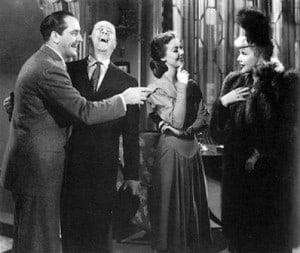 The third film, now from 1941, has nothing in common with the other three, though it has the distinction of being perhaps the best of the four. The major stars are Fredric March, Loretta Young, Allyn Joslyn, Eve Arden and Robert Benchley.
The third film, now from 1941, has nothing in common with the other three, though it has the distinction of being perhaps the best of the four. The major stars are Fredric March, Loretta Young, Allyn Joslyn, Eve Arden and Robert Benchley.
With a somewhat convoluted plot, though brilliantly executed by the stars, who, honestly, in refusing to take any of this seriously, make the goings-on entertaining and the absurdity of it all a delight. Seems that Broadway playwright Luke Drake (March) wants to star his wife Jane (Young) in his latest play, but she prefers to retire to Connecticut. An argument over the situation follows, and she heads for Reno to get a divorce.
While in Reno, and beginning to date William Dudley (Joslyn), Jane reads in the newspaper that a Virginia Cole (Arden) has been cast as the lead in Luke’s new play and returns to check on things. As Luke explains to Virginia, the newspaper article is a fake to lure Jane back into his life and into his play. He tells Virginia she is just to pretend to be in the play.
During the rehearsals, Luke discovers that Jane is engaged to Dudley. When Jane provides some acting suggestions, Virginia feigns being offended and storms from the theater—Luke’s cue to stress he now has no leading lady and without one will lose money. Jane agrees to take over the role, but only temporarily until he can find someone else.
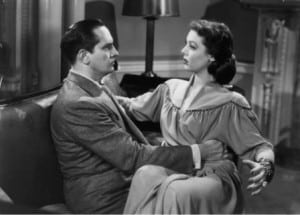 Then Jane learns that Luke and friend Eddie Turner (Benchley) have schemed to have Dudley arrested. After bailing Dudley out of jail, she leaves the play—permanently. Without a leading lady, Luke has to close the play. Luke and Eddie, now joined by friend Emma (Helen Westley), sit around a table at a restaurant and, with ample amounts of liquor, bemoan the close of the play and Luke’s financial ruin. One of the best scenes in the film.
Then Jane learns that Luke and friend Eddie Turner (Benchley) have schemed to have Dudley arrested. After bailing Dudley out of jail, she leaves the play—permanently. Without a leading lady, Luke has to close the play. Luke and Eddie, now joined by friend Emma (Helen Westley), sit around a table at a restaurant and, with ample amounts of liquor, bemoan the close of the play and Luke’s financial ruin. One of the best scenes in the film.
As Luke is going through Jane’s Reno hotel receipts, he realizes he can prove that her marriage to Dudley is illegal. But how to stop its consummation at their hotel? Using first one then another of five or more courtesy phones in the hotel lobby, he complains about suite 725 where the couple are staying—it needs a linen change, there’s a leaky faucet, there’re bugs in the bedroom, the noise is disturbing. He orders eight chicken dinners and directs a group of rowdy conventioneers upstairs to add to the confusion. With all the people milling about, it’s something like the bedlam in the smaller, even more crowded stateroom in A Night at the Opera, perhaps the best of the Marx Brothers harebrainers, Duck Soup a respectable second.
Of course, Luke and Jane are reconciled and at film’s end she announces from the stage that the play will soon close, that she’s expecting a child.
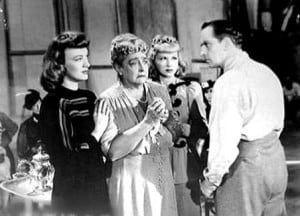 The film’s antics are ably directed by Alexander Hall, a name which may elude the memories of some followers of the movies of the ’30 and ’40s. His most famous film, and probably his best, is Here Comes Mr. Jordan, also made in 1941, one of at least three versions of the play Heaven Can Wait. He also directed The Amazing Mr. Williams (see our review). In 1942, Hall would direct My Sister Eileen, with Rosalind Russell and Brian Aherne; later—and better—it would be directed in ’55 by Richard Quine, with Janet Leigh and Jack Lemmon.
The film’s antics are ably directed by Alexander Hall, a name which may elude the memories of some followers of the movies of the ’30 and ’40s. His most famous film, and probably his best, is Here Comes Mr. Jordan, also made in 1941, one of at least three versions of the play Heaven Can Wait. He also directed The Amazing Mr. Williams (see our review). In 1942, Hall would direct My Sister Eileen, with Rosalind Russell and Brian Aherne; later—and better—it would be directed in ’55 by Richard Quine, with Janet Leigh and Jack Lemmon.
Those viewers who are accustomed to Fredric March in more dramatic roles, especially toward the end of his career, when, perhaps, his age left no alternative, may be surprised by his skill in comedy. He did, after all, do the occasional romantic comedy—Laughter with Nancy Carroll, Susan and God with Joan Crawford, There Goes My Heart with Virginia Bruce and, arguably his best comedy, Nothing Sacred with Carole Lombard. If he seems just a bit stiff on occasions in Bedtime Story, his interminable and slightly oversized suits may contribute to that impression.
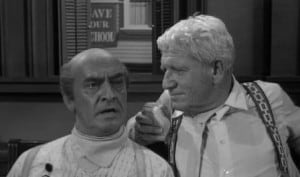 Beyond Bedtime Story and the other comedies mentioned, March’s most impressive work is in drama. There are the occasional missteps, of course. In one example of miscasting, he is clearly too old for the title character in Anthony Adverse (see our review). He becomes almost invisible in the secondary roles in The Bridges at Toka-Ri and The Man in the Gray Flannel Suit, when the likes of William Holden and Gregory Peck steal the scenes by their mere presence, even when, as in both cases here, the two actors are less than at their best. In a few other films the scripts turn March into a nonentity, hard to do in his case, always being, at least, a conscientious presence.
Beyond Bedtime Story and the other comedies mentioned, March’s most impressive work is in drama. There are the occasional missteps, of course. In one example of miscasting, he is clearly too old for the title character in Anthony Adverse (see our review). He becomes almost invisible in the secondary roles in The Bridges at Toka-Ri and The Man in the Gray Flannel Suit, when the likes of William Holden and Gregory Peck steal the scenes by their mere presence, even when, as in both cases here, the two actors are less than at their best. In a few other films the scripts turn March into a nonentity, hard to do in his case, always being, at least, a conscientious presence.
In many other movies, he is in top form—Dr. Jekyll and Mr. Hyde (1931), his first Oscar; the original A Star Is Born with Janet Gaynor; The Best Years of Our Lives, his second Oscar; Inherit the Wind (1960) opposite Spencer Tracy, a personal favorite; and Seven Days In May—quite a remarkable list, and by no means complete, either in quantity or quality. Despite his age, he takes advantage of the young stars of the time, and, without make-up, is poignantly convincing as the older man opposite Kim Novak in Middle of the Night.
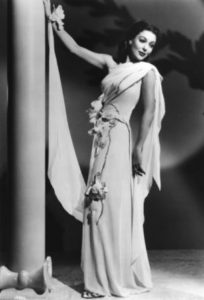 Unlike March, whose career was generally limited to screen and stage, with only sporadic ventures into television, Loretta Young made TV a second career, if not as long, then as successful as her movie one. After her last theatrical film, It Happens Every Thursday in 1953, she went that year into the first of two versions of The Loretta Young Show, until 1963, making three TV movies thereafter. In Bedtime Story, she is the familiar Loretta Young—lovely, perky, always smiling, immaculately attired, as when she comes through the door in the opening of her TV show. It is here, as in most of her comedies and semi-serious films, that she is most comfortable with herself, an image, however, that has led some to accuse her acting of being limited in range.
Unlike March, whose career was generally limited to screen and stage, with only sporadic ventures into television, Loretta Young made TV a second career, if not as long, then as successful as her movie one. After her last theatrical film, It Happens Every Thursday in 1953, she went that year into the first of two versions of The Loretta Young Show, until 1963, making three TV movies thereafter. In Bedtime Story, she is the familiar Loretta Young—lovely, perky, always smiling, immaculately attired, as when she comes through the door in the opening of her TV show. It is here, as in most of her comedies and semi-serious films, that she is most comfortable with herself, an image, however, that has led some to accuse her acting of being limited in range.
While it’s true that Young won her only Academy Award for a comedy, The Farmer’s Daughter, she is more than convincing in a number of heavy-toned dramas. In The Accused, as an intended rape victim, she kills her assailant, then covers her tracks by staging his death as a car accident. One of Young’s most atypical roles, though she remains lovely and elegantly attired through it all, is The Stranger(see our review), where she slowly discovers that her new husband is a former Nazi bent on killing her when she suspects his identity. The terror she shows on screen is frighteningly real—so much for her so-called “limited range”!
 Allyn Joslyn, who went into TV the same year as Young, is well cast in Bedtime Story as the actress’s somewhat excitable second love interest, the kind of ungainly, undesirable husband material he perfected in Heaven Can Wait (1943), where he is rejected by Gene Tierney.
Allyn Joslyn, who went into TV the same year as Young, is well cast in Bedtime Story as the actress’s somewhat excitable second love interest, the kind of ungainly, undesirable husband material he perfected in Heaven Can Wait (1943), where he is rejected by Gene Tierney.
And rounding out the cast is, first, Eve Arden, with her wise-cracking expertise intact in Bedtime Story. She went into TV a year earlier than Young and Joslyn. Robert Benchley, the grandfather of Peter Benchley, the author of Jaws and The Deep, is less acerbic than usual in most of his movies. Westley, part of the drinking trio in the restaurant scene, is famous, as here, for her roles as stern dowagers on the order of Florence Bates and May Robson. As the inevitable maid or nurse in any number of films—Ninotchka, Laura, Since You Went Away—Dorothy Adams is Betsy in Bedtime Story. And Olaf Hytten—look quickly to see him as Alfred—is in six of the Nigel Bruce/Basil Rathbone Sherlock Holmes films, as well as Casablanca and a host of other films.
The cinematographer is Frank Capra’s favorite, Joseph Walker, quite a plus for any director, and the music is by Werner R. Heymann, if not much of a presence in Bedtime Story, then more impressive in his scores for two Ernst Lubitsch films, Ninotchka and To Be or Not to Be(see review).
After all, it’s not the camera, or the score, that captures, or is meant to capture, the interest here, but the antics, acting and humor of the leading players. Watch this film and have a bit of innocent fun.
